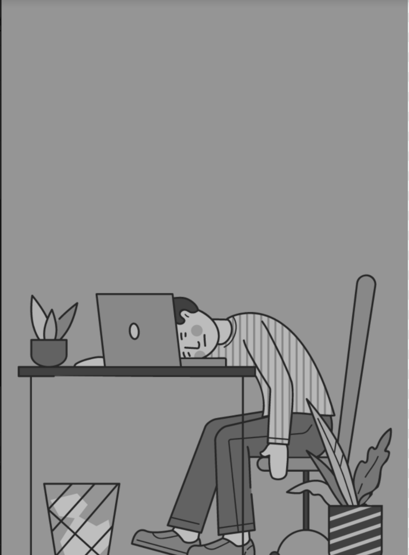Before I finally sat down to write this article, I checked my email about five times, drank two glasses of coffee, ‘accidentally’ came across an illustration book on my bookshelf and went through it page by page, and even read a completely irrelevant article about Jeff Bezos. Finally, I opened the word document. Then I got up and made one more glass of coffee. The time I spent on these useless activities would’ve been enough for the first draft of this article. Unfortunately, our brain rarely follows simple logic.
We could say that my day’s actions were caused by laziness but that would be a wrong understanding of the issue. What we’re dealing with here is called procrastination, and it affects every one of us at some point in our lives.
What is procrastination?
As mentioned, procrastination is the habit of avoiding important work and it affects 95% of the population – some more, some less. The difference between procrastination and laziness is the fact that the former is an active process while the latter is a more passive one. When we procrastinate we deliberately choose to replace important work with unimportant or easy tasks.
To break this bad habit, we first have to be able to identify it. Common signs of procrastination are:
Wasting the day on trivial tasks.
Checking emails and social media before or during the working process.
Taking long and frequent breaks.
Waiting for the right time to start working which, I’ll let you on a secret, will never come.
Sounds familiar? What happens here is that you’re practically wasting the most precious resource you have – for no reason. Apart from that, avoiding work causes anxiety and evokes a sense of guilt which negatively affects your mood, motivation, and chances of development.
What causes procrastination?
If procrastination is so wrong and inefficient, then why do we do it? Well, the exact answer to that question is individual and depends on specific situations. The better you understand your personal reasons, the easier it will be to combat the problem. So, before we move on to some advice, let’s have a look at the most common causes of avoiding work. Read each of them carefully and try to identify your personal reasons.
The work you have to do is boring or unpleasant.
But, even when it comes to your favorite tasks, you might still be tempted to delay working on them. Often the reason for that is the fear of bad results that make small and easy tasks more appealing.
You may be surprised, but some are afraid of success just as others are afraid of failure. They get scared by the fact that the result of their good work might not be as grand as they’ve imagined it. For example, some would rather not write an article than get only a few clicks and likes.
Perfectionists aren’t safe from procrastinating, either. Often, when they think they don’t have the necessary skills to do certain work, they’d rather avoid it altogether.
But probably the most widespread reason for avoiding work is bad planning. You don’t know what task you should start working on, and you spend too much time and effort trying to figure that out. This kind of chaos in your mind causes stress and demotivation. If planning your day is troubling for you, we recommend you read our 7 pieces of advice on how to simplify your workday.
How to resist procrastination
Think about how much time you waste daily to avoid the tasks you’ll still have to do in the end. The worst part of procrastination is the fact that while you’re at it, you can’t even be working on other meaningful stuff.
The best way to deal with this issue is to become more focused. Obviously, you’ll still need to organize your day rationally, but the main goal is to be concentrated on what you’re doing when you have to be doing it. Sounds simple, but we all know it’s not. All of it becomes even harder during the digital era where we have so many distractions at our hands. And, that’s exactly what our first advice is about:
1. Turn off social media
Social networks are the sneakiest time thieves. Scrolling through Facebook and chatting with friends takes so much of your day without you even noticing it. So, give yourself working hours when you log out of all social media, turn off the sound of your phone, and focus on what’s urgent.
If it’s just as hard for you to turn off social media as for everyone else, there are apps that could help you with it. For example, cold turkey. The software lets you block certain webpages so that you can concentrate on what’s important.
2. Challenge a friend
Needless to say, when people work together, their motivation is higher. The same goes for visualizing results and getting a pat on the back. Unfortunately, we all have to do most of our work alone, and nobody’s applauding at every tiny progress we make. But it doesn’t have to be like that.
Make a pact with your friend who’s struggling just like you, and send each other texts on how you managed your workload, daily. Motivating each other and having someone to support you is a great way to stop procrastinating.
3. Break down big tasks into smaller ones
A monthly or even weekly project sounds scary. But when we break them down into smaller tasks, it all starts to look much easier. For example, instead of thinking about a finalized, edited article with lots of links and images and a good title, I tend to concentrate on a draft first, then on editing the piece, writing the headline, and so on. The task of tomorrow is a task of tomorrow, and you don’t need to be thinking about it while your working on today’s to-do list.
4. Concentrate on personal reasons
Often we’re lazy to do certain tasks because they do not inspire us. At those moments try to identify a personal goal because of which you have to work on that boring task. For example, I am writing this article because I want to spread knowledge about procrastinating and help people move past it. But more importantly, I’m writing because I want to become a good writer and every word I put down brings me closer to that goal. Find your personal reasons aside from getting paid and acknowledged and hold on to it when you find yourself scrolling Facebook instead of working.
5. Give yourself small rewards
OK, maybe you won’t always remember your ambitions. That’s why we have small rewards!
Give yourself something nice after completing a task, be it watching your favorite TV show, eating snacks, or hanging out with friends. It will connect working with pleasurable experiences and reinforce the working habit.
6. Set aside some time for healthy procrastination
When you wasting your time when you should be working, you feel guilty. When you’re wasting your time as per your schedule, you feel refreshed and well-rested. Setting some time aside for literally nothing will help you lower stress and be more productive in the end.
Give yourself an hour a day, then do whatever you feel like doing during that time. Who knows, you may even find a new hobby




6 tricks to help you stop procrastinating
13 November 2020Before I finally sat down to write this article, I checked my email about five times, drank two glasses of coffee, ‘accidentally’ came across an illustration book on my bookshelf and went through it page by page, and even read a completely irrelevant article about Jeff Bezos. Finally, I opened the word document. Then I got up and made one more glass of coffee. The time I spent on these useless activities would’ve been enough for the first draft of this article. Unfortunately, our brain rarely follows simple logic.
We could say that my day’s actions were caused by laziness but that would be a wrong understanding of the issue. What we’re dealing with here is called procrastination, and it affects every one of us at some point in our lives.
What is procrastination?
As mentioned, procrastination is the habit of avoiding important work and it affects 95% of the population – some more, some less. The difference between procrastination and laziness is the fact that the former is an active process while the latter is a more passive one. When we procrastinate we deliberately choose to replace important work with unimportant or easy tasks.
To break this bad habit, we first have to be able to identify it. Common signs of procrastination are:
Wasting the day on trivial tasks.
Checking emails and social media before or during the working process.
Taking long and frequent breaks.
Waiting for the right time to start working which, I’ll let you on a secret, will never come.
Sounds familiar? What happens here is that you’re practically wasting the most precious resource you have – for no reason. Apart from that, avoiding work causes anxiety and evokes a sense of guilt which negatively affects your mood, motivation, and chances of development.
What causes procrastination?
If procrastination is so wrong and inefficient, then why do we do it? Well, the exact answer to that question is individual and depends on specific situations. The better you understand your personal reasons, the easier it will be to combat the problem. So, before we move on to some advice, let’s have a look at the most common causes of avoiding work. Read each of them carefully and try to identify your personal reasons.
The work you have to do is boring or unpleasant.
But, even when it comes to your favorite tasks, you might still be tempted to delay working on them. Often the reason for that is the fear of bad results that make small and easy tasks more appealing.
You may be surprised, but some are afraid of success just as others are afraid of failure. They get scared by the fact that the result of their good work might not be as grand as they’ve imagined it. For example, some would rather not write an article than get only a few clicks and likes.
Perfectionists aren’t safe from procrastinating, either. Often, when they think they don’t have the necessary skills to do certain work, they’d rather avoid it altogether.
But probably the most widespread reason for avoiding work is bad planning. You don’t know what task you should start working on, and you spend too much time and effort trying to figure that out. This kind of chaos in your mind causes stress and demotivation. If planning your day is troubling for you, we recommend you read our 7 pieces of advice on how to simplify your workday.
How to resist procrastination
Think about how much time you waste daily to avoid the tasks you’ll still have to do in the end. The worst part of procrastination is the fact that while you’re at it, you can’t even be working on other meaningful stuff.
The best way to deal with this issue is to become more focused. Obviously, you’ll still need to organize your day rationally, but the main goal is to be concentrated on what you’re doing when you have to be doing it. Sounds simple, but we all know it’s not. All of it becomes even harder during the digital era where we have so many distractions at our hands. And, that’s exactly what our first advice is about:
1. Turn off social media
Social networks are the sneakiest time thieves. Scrolling through Facebook and chatting with friends takes so much of your day without you even noticing it. So, give yourself working hours when you log out of all social media, turn off the sound of your phone, and focus on what’s urgent.
If it’s just as hard for you to turn off social media as for everyone else, there are apps that could help you with it. For example, cold turkey. The software lets you block certain webpages so that you can concentrate on what’s important.
2. Challenge a friend
Needless to say, when people work together, their motivation is higher. The same goes for visualizing results and getting a pat on the back. Unfortunately, we all have to do most of our work alone, and nobody’s applauding at every tiny progress we make. But it doesn’t have to be like that.
Make a pact with your friend who’s struggling just like you, and send each other texts on how you managed your workload, daily. Motivating each other and having someone to support you is a great way to stop procrastinating.
3. Break down big tasks into smaller ones
A monthly or even weekly project sounds scary. But when we break them down into smaller tasks, it all starts to look much easier. For example, instead of thinking about a finalized, edited article with lots of links and images and a good title, I tend to concentrate on a draft first, then on editing the piece, writing the headline, and so on. The task of tomorrow is a task of tomorrow, and you don’t need to be thinking about it while your working on today’s to-do list.
4. Concentrate on personal reasons
Often we’re lazy to do certain tasks because they do not inspire us. At those moments try to identify a personal goal because of which you have to work on that boring task. For example, I am writing this article because I want to spread knowledge about procrastinating and help people move past it. But more importantly, I’m writing because I want to become a good writer and every word I put down brings me closer to that goal. Find your personal reasons aside from getting paid and acknowledged and hold on to it when you find yourself scrolling Facebook instead of working.
5. Give yourself small rewards
OK, maybe you won’t always remember your ambitions. That’s why we have small rewards!
Give yourself something nice after completing a task, be it watching your favorite TV show, eating snacks, or hanging out with friends. It will connect working with pleasurable experiences and reinforce the working habit.
6. Set aside some time for healthy procrastination
When you wasting your time when you should be working, you feel guilty. When you’re wasting your time as per your schedule, you feel refreshed and well-rested. Setting some time aside for literally nothing will help you lower stress and be more productive in the end.
Give yourself an hour a day, then do whatever you feel like doing during that time. Who knows, you may even find a new hobby